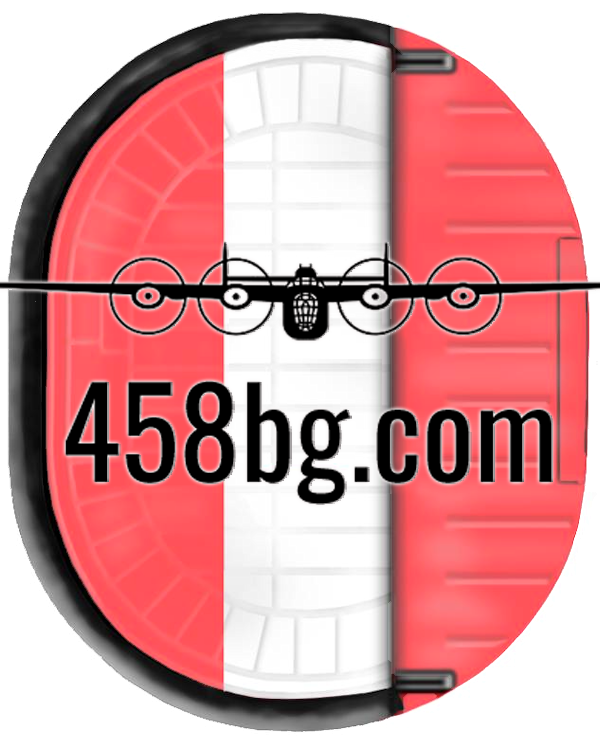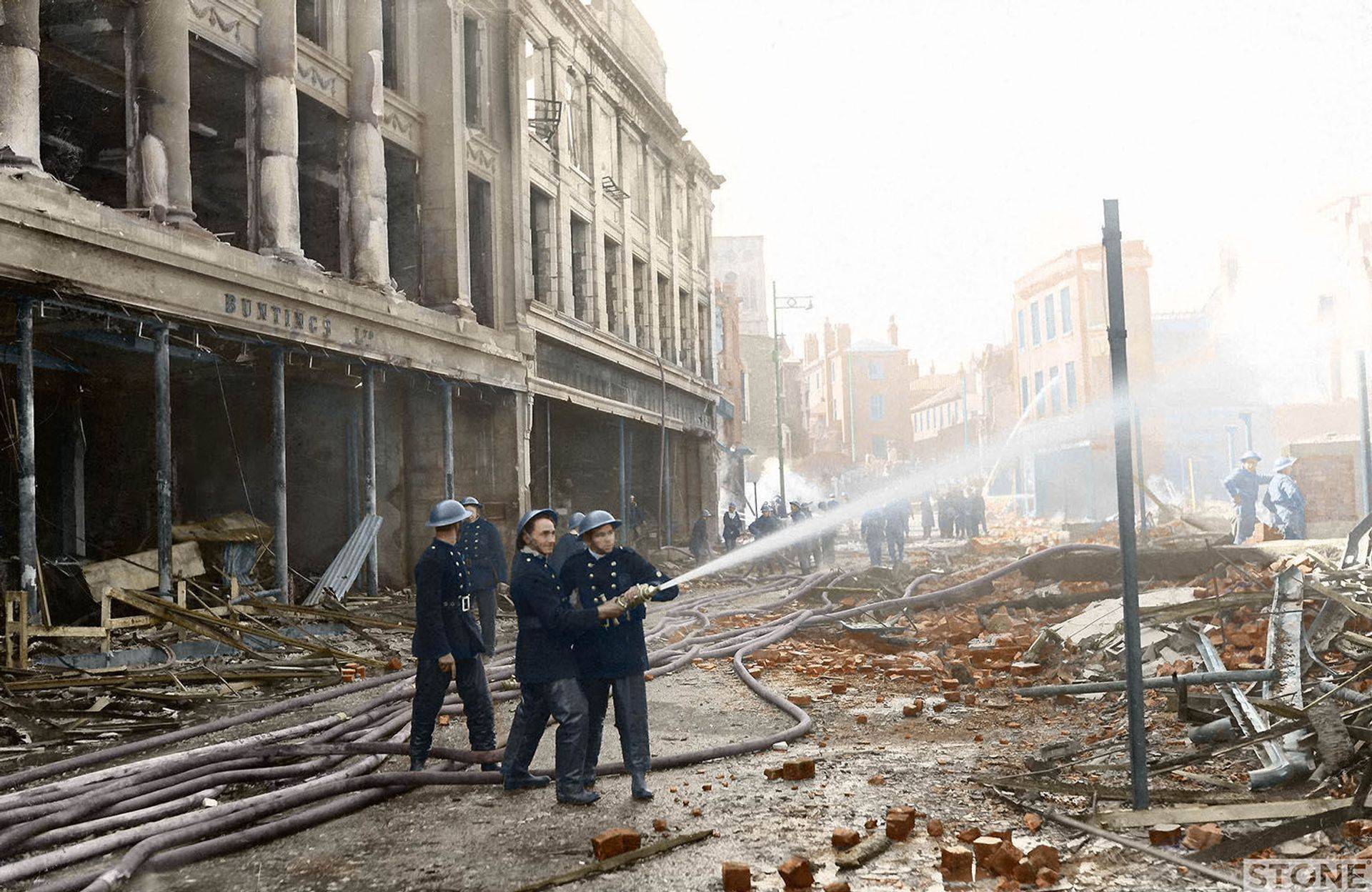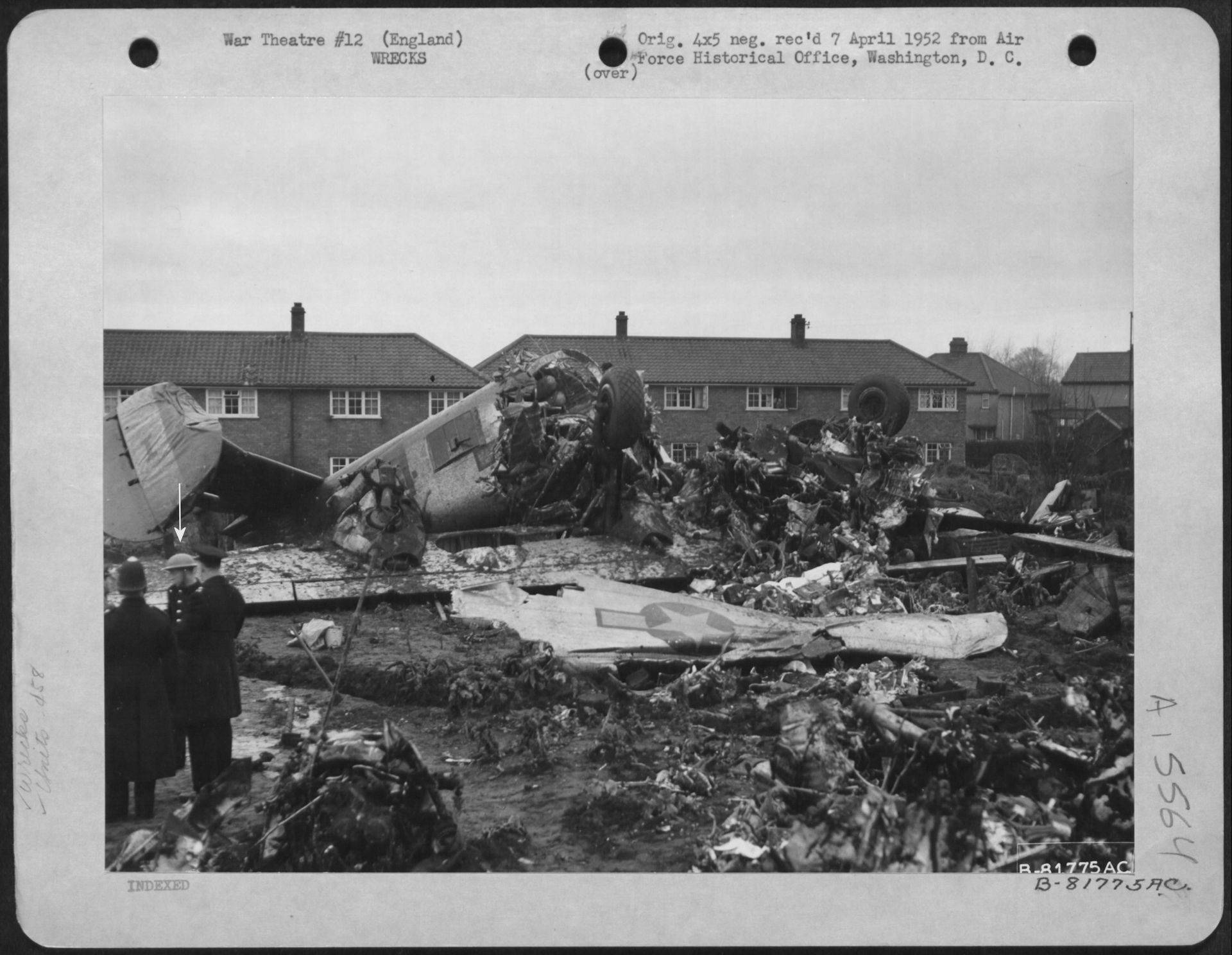458th Bombardment Group (H)
Norman Cooper
April 30, 1942: Norwich Auxiliary Fire Service: Outside Curls store, Rampant Horse Street corner with Brigg Street
(Image: Nick Stone)
Interview with Trevor Hewitt
Mr. Cooper was a Volunteer Fireman in the Auxiliary Fire Service (AFS) based at the Fire Station, Bethel Street in the centre of Norwich. He was aged 95 when this interview with Trevor Hewitt took place in 2005. The main topic of conversation was about his attending the 8th of May 1944 the crash in the village of Frettenham, Norfolk of the B24 Liberator “Belle Of Boston” of the 754th Squadron, 458th Bomb Group, RAF Horsham Saint Faith, Norfolk. Trevor’s grandfather and father were the first on the scene that day. [Interviewer’s questions and comments are in italics.]
————————————–
Norman: We (the firemen) were still in bed in the fire station situated in Bethel Street, Norwich, when we got the “Shout”. We were dressed in our shirts and socks at the time and jumped out of bed, put on our trousers and made our way to the Fireman’s Pole in the next room. We were on the top floor of the fire station. We put our arms and legs round the pole and slid down to the ground floor. We were usually looking at about 15 seconds to get down to appliance room. We looked across at the Tally Board on the wall to see if your call light had been lit and it was. Our boots were standing near our appliance and we would put our jackets and helmets on as we were driving out of the station.
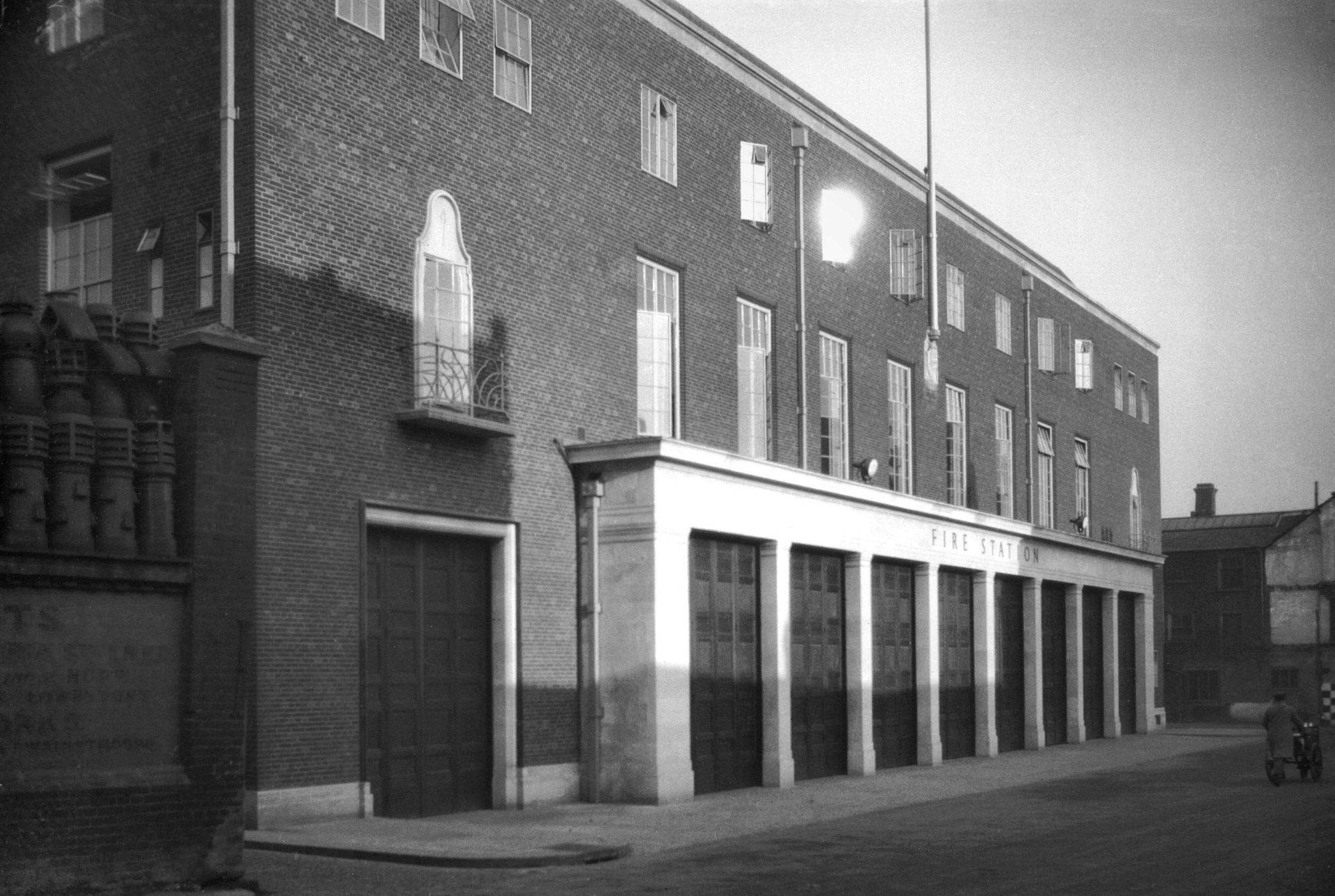
Question: How long did it take normally to get on the road to the call?
Norman: It usually took about a minute and a half in all from “Shout” to driving through the station doors.
Question: How many of you were there on the fire engine?
Norman: We were two man crews working on small lorry type appliances with a petrol engine water pump and a water tank on the back. On this occasion [May 8th 1944] my driver for the incident was a Mr. Hazel. He was a lot older than me as were most of the other fireman at the time, so I would think it is fair to say that I am probably the only one left alive today.
Question: Which way did you go out to the crash site at Frettenham?
Norman: We made our way through Hellesdon onto the Cromer road and turned right into Horsham Saint Faith village and then through to Frettenham.
Question: How long roughly did it take to get there?
Norman: We arrived there at around 6.45am I think. When we got there to near the crash site we could see all these big bombs laying about on the lane. We had to dodge round the bombs in the fire appliance in order to get to the crash. When we had got through the bombs we saw that the plane had gone in to this wooded area like a plantation.
Question: What was it like when you arrived at the crash?
Norman: When we stopped, I got off the engine to see what was needed to be done, we could see the remains of the fuselage laying on its side. There was a fellow laying on the ground by the side of the road and he was screaming his head off and was being comforted by a young chap who was looking after him. He had it seemed broken his legs or something. I crawled into the remains of the fuselage because there was one of the airman in there but as soon as I looked at him I realised he was beyond help. It seemed that there were about 4 of the crew who were alive, one of them hardly injured. I think most of the “Yanks” arrived at about the same time as us and it seems they brought Parson with them who gave Last Rites to those that had not made it.
Question: What else did you have to while you were there?
Norman: It was as hot as hell all around and bullets were going off and shooting about so we had to put a fire hose on to hose the area down as it was so hot on the ground. We didn’t get away from there till well after 12 o’clock, probably nearer 1 o’clock in the afternoon, as we had to make sure all the fires had been damped down before we left. We didn’t want them springing up again after we had gone. The plane was strewn about the woodland quite a bit. When I saw the photo of the crash site in the paper a few days ago it was just as I remembered it being on the day.
[It was at this point that I showed Norman the photo I had of the crash site with me at the time of the interview].
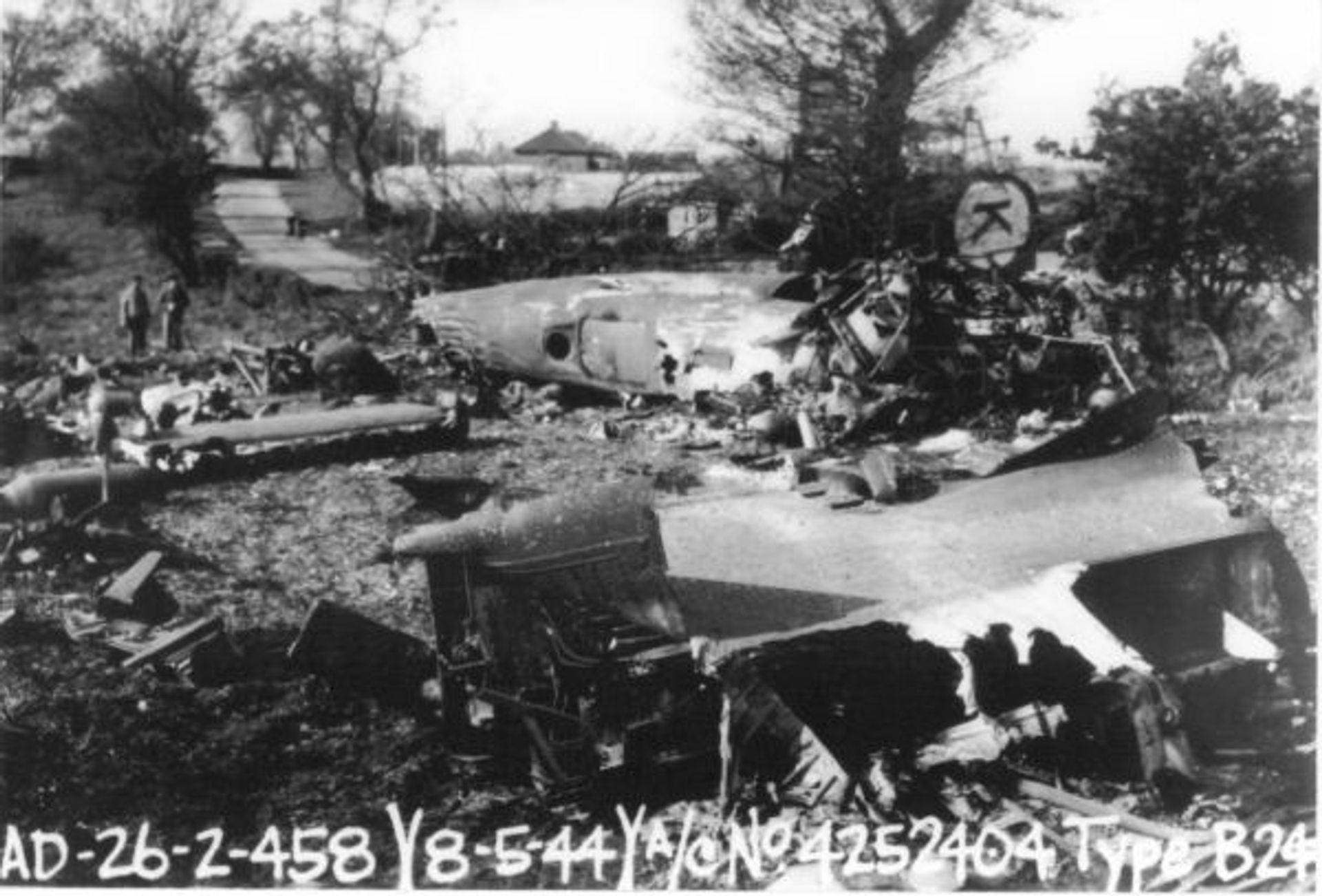
May 8, 1944, Frettenham: Lt Kingsley and crew (754BS) flying Belle of Boston crashed shortly after takeoff.
That is just how I remember it, I can honestly say that was one of the most frightening “Shouts” I had been on.
Question: Why do you say that Norman?
Norman: Because of the bullets going off in the fires all the time and those bloody big bombs laying about all over the place, really put the fear of God into me and my mate. But we had a job to do and just had to get on with it and worry about it later.
Question: That must have been scary, just as you say Norman!
Norman: My Boy, there was a wartime saying we had back then you know, which was “Keep Calm And Carry On”, so that is what we had to do!
[It was at this point that Norman said he was putting the kettle on for a cup of tea and would I like one. I of course answered, “Yes”. I never turn the opportunity down for a cuppa! When Norman returned with the tea we carried on with the conversation.]
I had been to several crashes before the one at Frettenham of course. We had one or two round the city actually. You know they used to tell us how to deal with aircraft crashes which was a load of old Squit generally. [Squit is a Norfolk dialect word meaning “absolute rubbish”]. When planes crash they don’t do that with the doors all wide open do they? No they don’t, I can tell you. The doors and metal of the plane are all spewed in together. You couldn’t undo a door generally. [“Spewed” another Norfolk word meaning crushed].
There was a particular plane we went to had landed in Spynke Road just off the Aylsham road that was a Liberator as well. I think he was trying to get into Horsham from what I can gather. He had landed right upside down in the gardens of the rows of houses surrounding it. One person in the wreckage couldn’t get out. There was a lot of fire and the heat was unbelievable. We could hear them in there and we tried to cut our way in with our axes but we couldn’t get to them. Eventually it all went quiet though. The really sad thing about that one is that two young kiddies were involved. They were in the garden playing I think, when it landed on them, that was a very bad one as well, I really did feel that one, bloody terrible I can tell you.
Question: Were there any others that you attended close to Horsham Norman?
Norman: Yes there was, one in particular was on Hastings Avenue, really close to the airfield. This was another Liberator, he had come down right next to a house in the road and was right up against the front door of the house. That was really going I can tell you, when we got there, a big fire. We could hear someone calling out but couldn’t make out if it was coming from the plane or the house. But again it went quite again after some time. That took a really long time for us to get under control and a long time damping down. Another nasty one that was.
Question: You went to several crashes then?
Norman: Yes, there were a number we went to. There was one at Horsford that was one of the other big yank planes, a Flying Fortress. They were at about 500 feet and something went wrong with it. It had caught fire and was flying along burning from end to end and they all jumped out. Dead, the whole lot of them. They all landed in a field in a line across the field, roasted, I will never forget that. We had all the bombs laying about the crash site as well on that one. I have been down that several times over the years past, that site, and I thought about that morning. Again we got home late after that one.
Going back to the crash at Frettenham, that didn’t burn itself right out you know, only parts of the plane were very badly burnt, but the surrounding bushes, etc. had really got going it seems. One of the wings had come off and was on the other side of the road on a house. I had a look at the cockpit, it was completely destroyed, no one could have survived that impact. I don’t know what would have happened if the trees hadn’t been there. He probably could have got her down, but maybe he would have slid into the houses by the road instead.
Many of the crashes we used to go to there was no fuselage to speak of left at all, they were just finished if you know what I mean. Fighters especially. I had been to several fighter crashes. I went to one out in the county, I forget the name of the place, [and] it was only a small village. I remember it was near a church, that was a fighter, in fact I think it had hit the church tower and of course it was one hell of a big fire. It was the middle of the night when we were there. We had our pump quite close to the fire and in the morning the chap who had been looking after and working the pump machinery to fight the fire and damp down discovered when the sun came up that the pilots head was laying next to him, he been standing with this feet next to it all night. That was one hell of a shock for him I can tell you.
Question: It seems you had a variation of experiences then Norman?
Norman: I had quite a bit of experience with all sorts of planes, see, being at the main station at Bethel Street we got the first call. I must say that all in all I did enjoy my time with the Fire Brigade. We did go to tree plantation and forest fires because of course Jerry had come over and dropped incendiary bombs which some dropped in the tinder dry tree areas. We spent a lot of time damping these down. It seems as soon as you left one place to move to another area the first fires had sprung up again. We seemed to spend a lot of the time in the Horsford area because of the large plantation areas around there. We filled the tanks up from a little brook that was there. We did that a lot.
Question: Did you attend a lot of fires during the bombing raids on Norwich?
Norman: Oh yes we did indeed. In fact I had a direct hit myself. A bomb dropped on my home, I was upstairs in the bathroom having a shave. I heard the planes come over the Earlham Road where I lived in Norwich. It was about ten o’clock at night. I ran down the stairs of the house, which was quite a big house. This was so I could go to into our basement. In the basement I had put in old steeltram lines to reinforce the ceiling which is obviously the floor of the room above. So if we had a bomb hit and the house fell down it would be a lot safer in the basement. I was just about to go in there when, ‘Whoomph!’ I thought to myself we have just been hit. I ran back up onto the floor where I had just been having my shave. The doors were all over the place and bits of rubble, just where I had been having my shave a few moments earlier. I could see right out the back of the house into Gladstone Street, which ran along the back of our house. The whole bloody back of our house had gone. The toilet, bathroom and a bedroom had disappeared. The front of our house had also been blown out, but as I stood in the street I could look up and see our bed and furniture still in the rooms, just like a girl’s dolls house. There was two killed in the house next door to us, they had their whole roof blown off. As I stood in the street I could hear someone crying, I realised that it was the old lady that lived in the house. So I ran up the stairs of the house and pulled her out and left her in the care of the air raid wardens who had arrived.
Question: What did you do then?
Norman: Well I was due to go on duty, that’s why I was having a shave. So I went to Bethel Street and fought fires till nine o’clock in the morning in another part of the city that had been hit.
Question: What? Even though your house had been blown to bits, you went to work?
Norman: Yes, it had been blown to bits. I did get compassionate leave for a day, and I borrowed a lorry and put all the furniture and belongings I could salvage from the house on it and drove it out to the town of Diss in South Norfolk. I had some friends who lived in Diss and they didn’t know I was coming. I got there at ten o’clock at night and they didn’t recognise me at first because I was as black as coal from the dirt and soot from the fires I had been fighting. We put all the furniture and things in a warehouse they owned. I had to be up again at five o’clock in the morning to bring the lorry back to Norwich, which I did. God, was I tired! But I had lost my home and everything. A lot of the furniture was broken and damaged, but we did save quite a bit in the end.
And then of course we had another raid on the Friday night all around the Dereham road side of Norwich and I thought to myself, ‘I bet we get another one on Wednesday night as well’. So I made my will out, I put it in the letter box and my wife didn’t get it till two or three days afterwards. She was living in Diss with our friends by then and travelling into Norwich for her work. The telephone was off so I couldn’t get hold of her at Diss to let her know the will letter was on its way, I was staying in Norwich because I still had to go out on the Fire appliance. When the house got hit that night, I couldn’t get hold of her at her works, she was working nights at that time. As I said I went off to fight fires from the raid and she didn’t half get a shock when she got back from work in the morning and saw the house was demolished after the raid, she didn’t know if I was alive or dead.
When I look back I realise how fortunate I was when that Jerry dropped those bombs, our road got the first stick and they dropped all along the West Parade right down the road, bloody miracle more were not killed, just the luck of the gods I reckon. There was nothing anyone could have done for those trapped in the houses, poor devils.
————————————–
It was at this time we finished our chat and I thanked Norman for taking the time to talk with me. Just a few weeks after I spoke with him, his house was sold and he went into a nursing home where his wife was already staying, so they were reunited again. They have since both passed away!
True heroes come in many shapes, sizes and forms. They will never tell you that are a hero, just that they had their bit to do and got on with it quietly, diligently and efficiently. As Norman quite rightly said, “Keep Calm and Carry On”, but without question or doubt, people like dear old Norman were heroes in the true meaning of the word!!
Crew 42 – May 8, 1944

1Lt Paul Kingsley and Crew 754BS
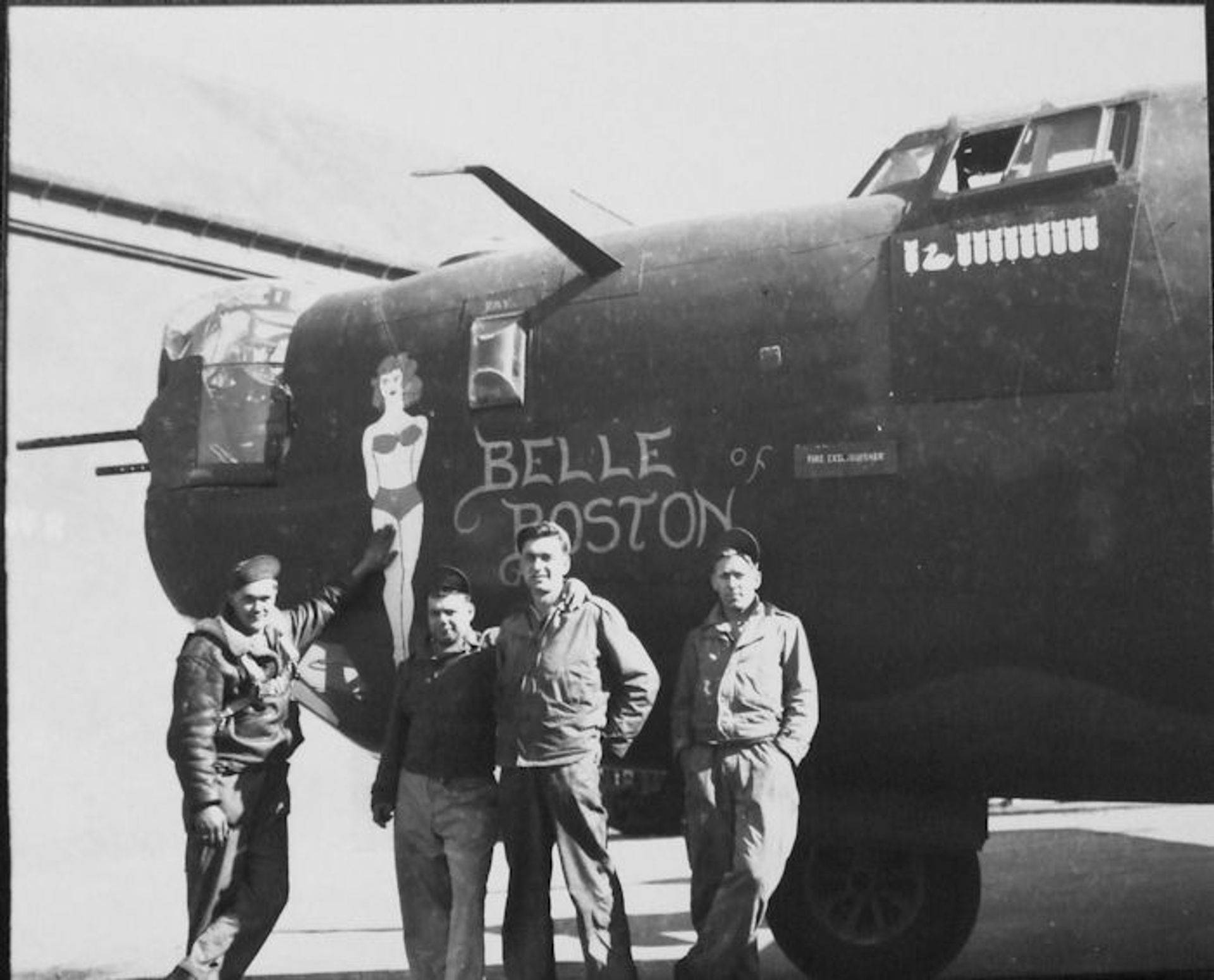
B-24H-15-FO 42-52404 Z5 Q Belle of Boston
Diehl Crew – January 14, 1945
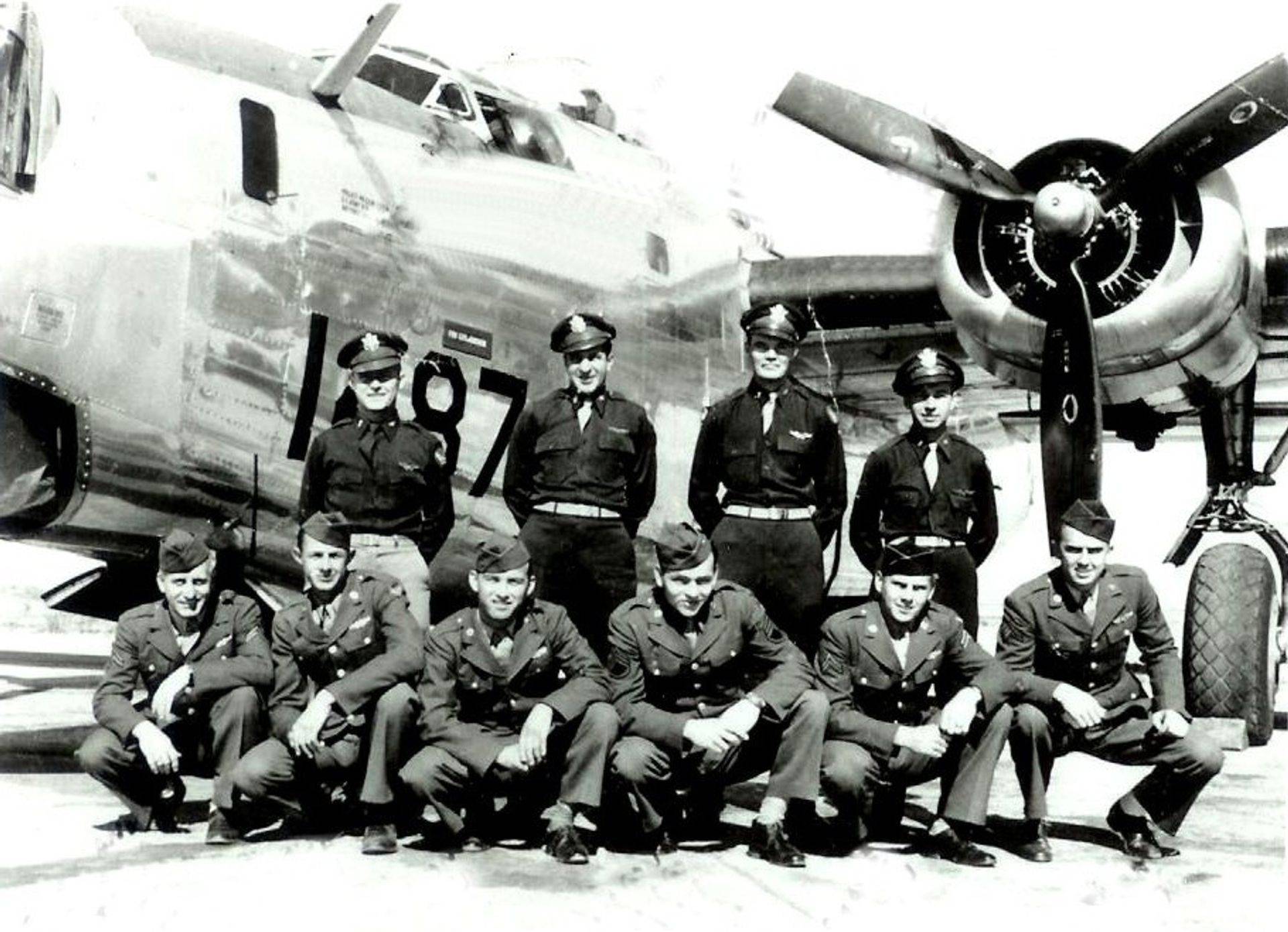
2Lt Stanley E. Diehl and crew 753BS

B-24JAZ-155-CO 44-40283 J4 I Lassie Come Home
